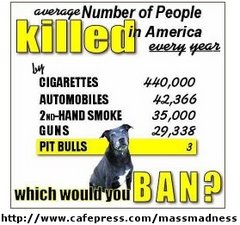Pit bull ban attacked
In the Toronto Star
Pit bull ban attacked
No exact definition of breed by experts
More common dogs lead bite statistics
May 16, 2006. 05:53 AM
PETER SMALL
COURTS BUREAU
Catherine Cochrane fears that Ontario's new pit bull legislation threatens her success in socializing her young dog.
Because Chess, her 2-year-old, may be captured under the new definition of pit bull, Cochrane can't take her out without a muzzle or let her run free with other canines.
"This is more likely to create problems," the 23-year-old Toronto anthropology student said outside a University Ave. courthouse yesterday. "I don't think it's the humane way."
Inside Superior Court, her lawyer Clayton Ruby was arguing, in a test case, that amendments to The Dog Owners' Liability Act enacted by the provincial government last year are unconstitutional.
Cochrane could be jailed six months and fined $10,000 if she ever runs afoul of the overly broad and vague changes that arbitrarily declare certain dogs to be pit bulls, Ruby told Justice Thea Herman.
An unidentified person at the Toronto Humane Society, where Cochrane adopted Chess, labelled the dog a Staffordshire terrier cross, but she's not sure that's true, he said. "She can't know if she is at risk."
Veterinarians and kennel clubs offer no exact definition of a pit bull — which can apply to 24 breeds, Ruby said.
Besides, the vast majority of so-called pit bulls are kind and gentle, he argued.
"There is always a risk that one dog will bite," Ruby told the judge. "The evidence in Canada is that pit bulls seem to be much safer in biting and deaths than many other breeds."
Since 1983, only one of 23 reported national fatalities from dog attacks involved so-called pit bulls, he said. A report on dog bites at eight Canadian hospitals in the mid-1990s showed that pit bulls were nowhere near the top of the list of offenders, he said. German shepherds led the pack, followed by cocker spaniels, Rottweilers and golden retrievers, according to the report.
A 1996 Toronto study showed that dogs identified as pit bull terriers accounted for 4 per cent of reported bites, Ruby said.
Under the new law, Ontarians must not acquire "pit bulls," now defined as "pit bull terriers," Staffordshire bull terriers, American Staffordshire terriers, and American pit bull terriers — or dogs that look substantially similar.
Current pit bull owners must sterilize their pets, and keep them muzzled and leashed when outside their own enclosed property. Offenders' pit bulls must be put down.
Protecting people from dog bites is "perfectly legitimate," Ruby said, but the law fails to deal with the real issue: problem owners. Some people truly want and create vicious dogs, whatever the breed, he argued.
Attorney General Michael Bryant has avoided going after irresponsible owners — who could have been prosecuted under the pre-existing law — because it's expensive, he said. Bryant chose the pit bull ban as a quick political fix, Ruby argued.
Government lawyers begin their counter-arguments today. Bryant said yesterday he was "very confident in our argument that the bill will withstand judicial scrutiny."
He added that, "a lot of effort went into this bill to make sure it was as specific as possible."
With files from Robert Benzie






























No comments:
Post a Comment